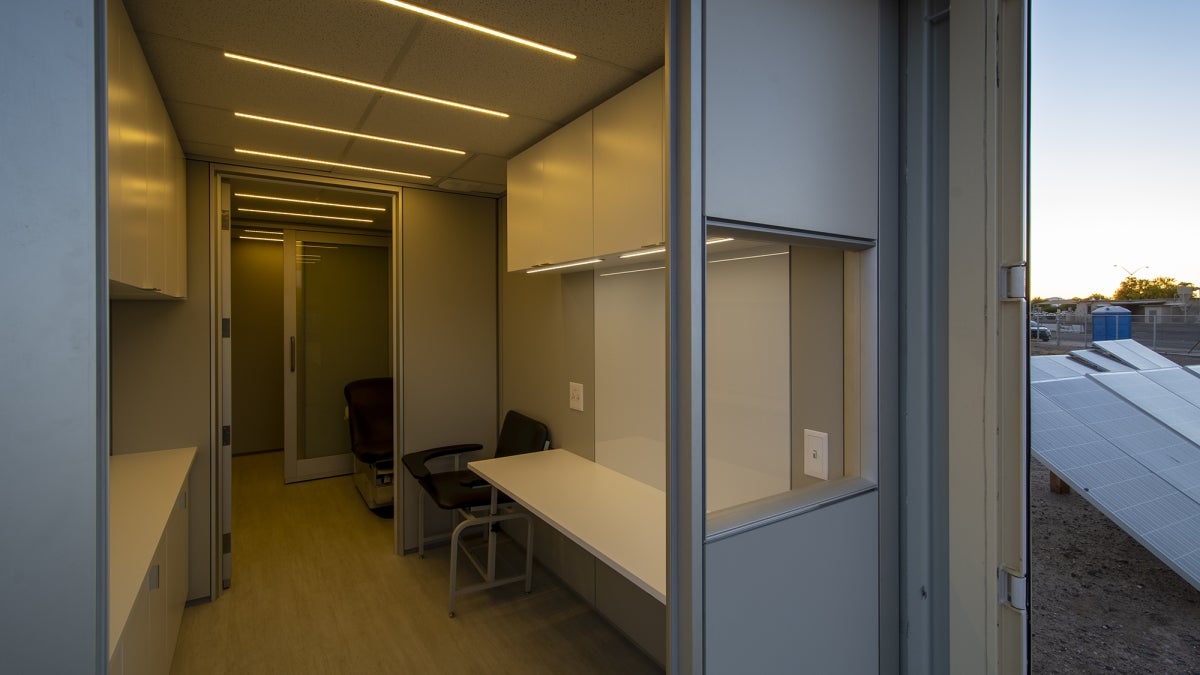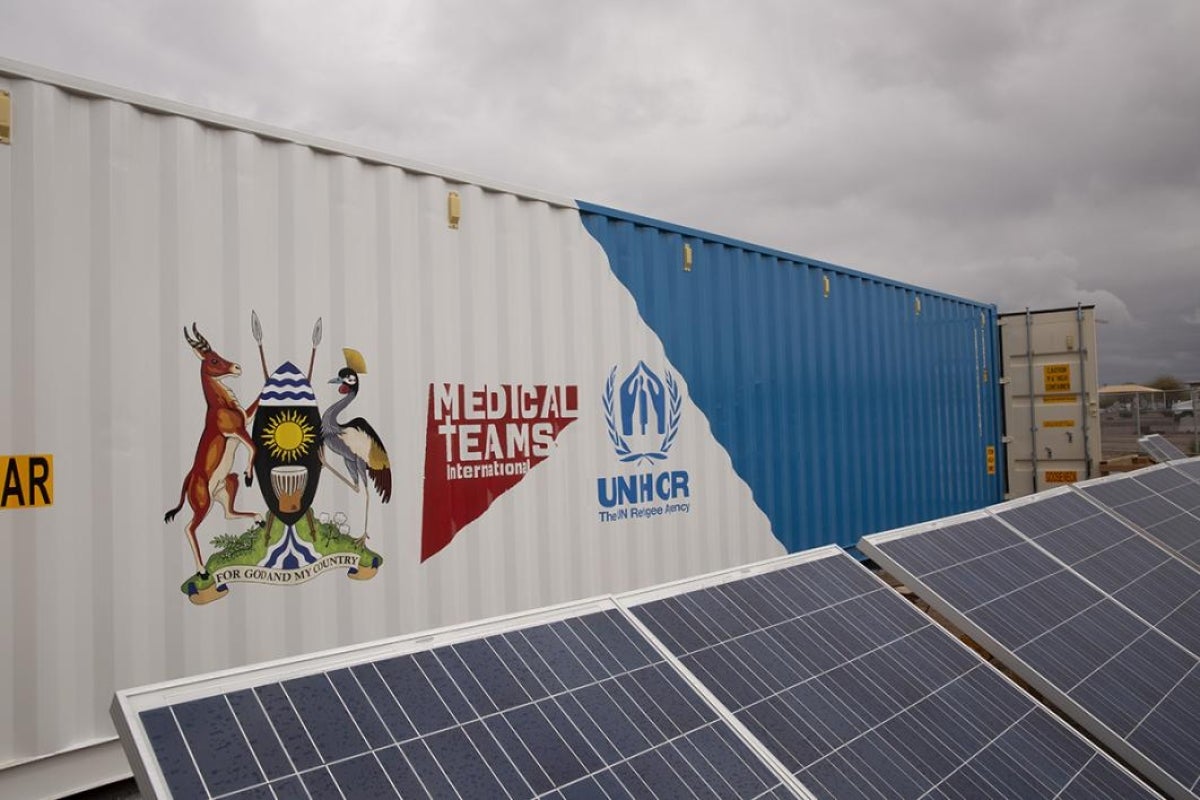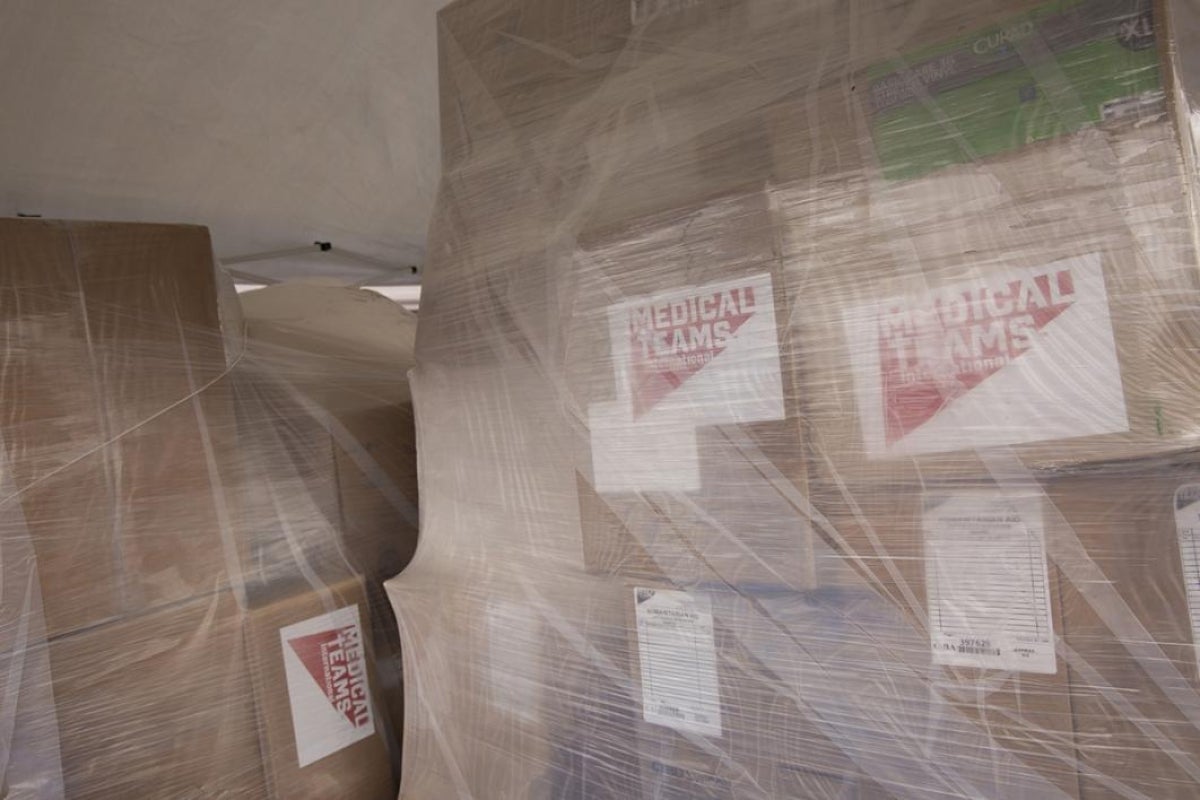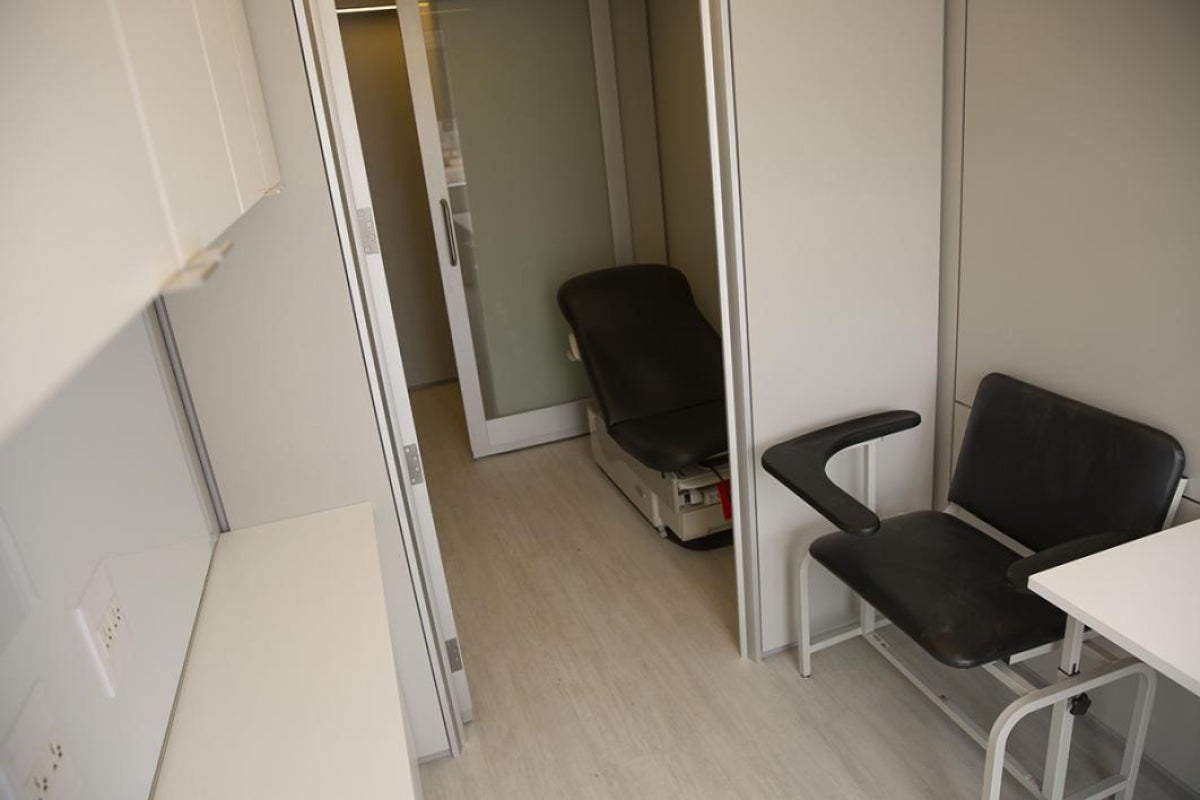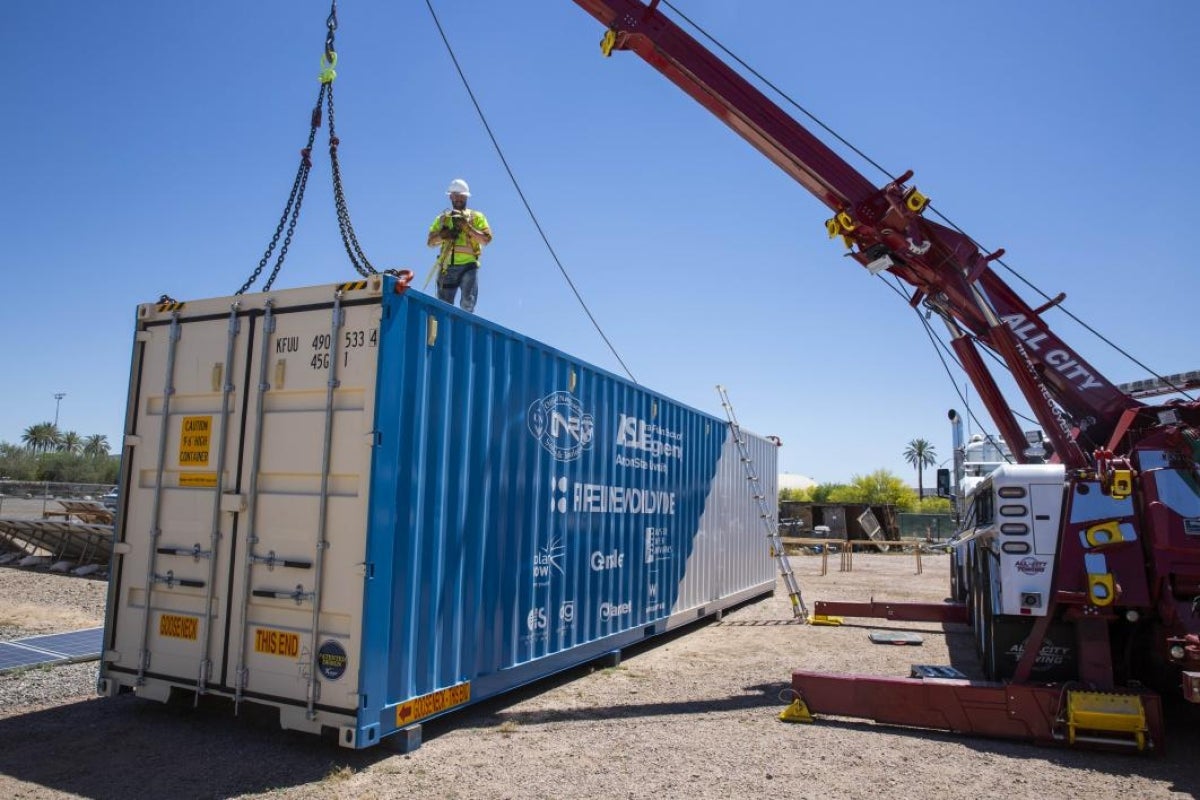The existing health care center at the Ayilo II Refugee Settlement in the Adjumani district of northern Uganda serves more than 12,000 South Sudanese refugees out of a cement block building and a few tented structures.
The settlement has wells that pump water to several access points on a rotational basis, but there is no direct water supply to homes or the clinic. Unreliable electricity affects caregivers’ ability to deliver consistent care, especially when performing tests for malaria, a critical health concern in the area.
But this August, stable power, clean water and an increased capacity to deliver care will be delivered to Ayilo II — in the form of a 40-foot shipping container that has been converted by ASU researchers to a self-sustaining medical clinic.
The rapidly deployable, turnkey, off-grid, solar-powered medical clinic is part of a $2 million, four-part research project funded by the U.S. Office of Naval Research (ONR) Defense University Research-to-Adoption Program.
Video by Deanna Dent/ASU Now
The medical clinic component of the research tasked ASU Professor Nathan Johnson and his team with creating rapidly deployable medical facilities with the ability to provide stable power and clean water for medical care in disaster relief, humanitarian aid and military operations environments.
“ONR funded the research, engineering, fabrication and testing of this prototype,” Johnson said. “Quality health care service starts with clean water and stable power, and our team was able to leverage our experience in these areas to create a system capable of operating in almost any condition or location.”
The resulting prototype clinic has a 10-kilowatt power system and a water treatment system capable of cleaning about 1,200 gallons an hour.
“We incorporated water tanks with ultraviolet sterilization equipment, solar panels, batteries, inverter systems and a backup generator to ensure the system will be self-reliant in almost any environment,” explained Cody Van Cleve, an engineering doctoral student who is coordinating the project.
The water system was a new design created and manufactured by Industrial Water Innovations specifically for the Uganda medical container. “We’ll be able to fill the 750-gallon tank and provide access to clean water as long as they have an input source.”
The power system has two inverters for 10 kW of total power and 20 kW of peak power. “In North America, 10 kW would power two to four homes,” Van Cleve said. Solar Now, a Uganda-based company that provides sustainable energy solutions, is providing equipment and will install the system at the camp and provide ongoing maintenance.
The bare-bones container was converted into a functional medical clinic by Corporate Interior Systems (CIS)/DIRTT Environmental Systems.
“We took 21 feet of the container and made a three-room clinic that we will be able to deploy to Africa, ready-to go,” explained Asa Plum, DIRTT champion for CIS Phoenix. “It’s sustainable and adaptable. All you have to do is open the doors and unload the supplies.
“We designed it for use with the power system on the back side of the clinic, which was built for Africa, not Phoenix, Arizona,” Plum said.
Tarkett and Wholesale Floors LLC donated the flooring materials and installation, and Gensler provided the clinic’s exterior design.
“Once the prototype was designed and fabricated, the decision about how and where to deploy the clinic was left up to us,” Van Cleve explained.
The ASU team, during a preliminary visit to Uganda, chose to collaborate with Medical Teams International, which was already working with the United Nations High Commission for Refugees as the primary care provider at the Ayilo II camp.
“They have the knowledge, staffing and history to use this system to its full potential and can use the additional support and infrastructure,” Van Cleve said.
Medical Teams International, a nonprofit organization, provides medical care and nutrition services around the world, including at more than 50 clinics throughout Uganda. In addition to delivering care services at the clinic at Ayilo II, the organization is providing the medical equipment and supplies for the project, which will ship inside the container when it is deployed this month.
“This project will save lives in Uganda,” said Joe DiCarlo, Medical Teams International’s global ambassador. “It will increase our capacity to serve people in need. It will act as a draw for new patients and our staff.
“But the real game changer is that it comes with its own water purification system and solar power,” DiCarlo said. “Water and power are practically nonexistent right now.” Medical providers in settlements often need to provide their own power and water.
A team from ASU will travel to Uganda when the container arrives in August to train workers from Solar Now to operate and troubleshoot the microgrid. Pipeline Worldwide provided funding for logistical and shipping assistance to get the container to Uganda and for an on-ground expert to help with in-country transportation and interpreting during both the preliminary and upcoming training visits.
“On-ground partners are a critical part of sustaining long-term project success,” Van Cleve said. “Medical Teams will staff and operate this clinic space after it is commissioned, and Solar Now, in addition to providing equipment, will help install and maintain the power system to ensure it continues to function optimally long after our departure.”
According to Whitney Tallarico, agility architect for ONR, the Defense University Research-to-Adoption program was created to connect academic researchers with industry and private-sector partners to align with the national defense strategy and leverage that knowledge going forward.
“As these challenges go out into the real world, they are important to not just our national security, but to global security,” Tallarico said. “We’re finding thought and tech leaders across industry and academia to parse out possibilities for the future.”
Containerized clinics such as the ASU prototype will ultimately equip medical service providers, whether in refugee camps or disaster zones, with self-sufficient medical facilities in any area that can be reached by truck, rail or ship.
“If you’d asked me as a freshman what work I would be doing today, I couldn’t have told you,” Van Cleve said. “Now, I look at the research and the products we’ve developed and I’m honored to work on projects that will make a difference in people’s lives.”
Top photo: A look inside the portable medical clinic that is custom-outfitted inside a shipping container. Photo by Asa Plum/Corporate Interior Systems
More Science and technology

ASU-led space telescope is ready to fly
The Star Planet Activity Research CubeSat, or SPARCS, a small space telescope that will monitor the flares and sunspot activity of low-mass stars, has now passed its pre-shipment review by NASA.…

ASU at the heart of the state's revitalized microelectronics industry
A stronger local economy, more reliable technology, and a future where our computers and devices do the impossible: that’s the transformation ASU is driving through its microelectronics research…

Breakthrough copper alloy achieves unprecedented high-temperature performance
A team of researchers from Arizona State University, the U.S. Army Research Laboratory, Lehigh University and Louisiana State University has developed a groundbreaking high-temperature copper alloy…


